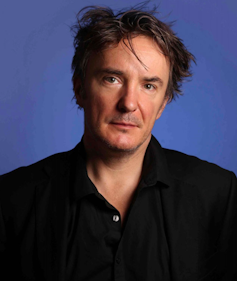When the Edinburgh International Festival launched in 1947, it was inevitable that a fringe event would follow. Beginning with just eight companies of performers in five venues, the Edinburgh Festival Fringe (known as “the Fringe”) is now the biggest arts festival in the world, and welcomes tens of thousands of performers across over 250 venues every August. Given the scale of the Fringe – almost 3,000 productions this month – navigating the array of shows on offer can be a challenge, so a visit needs some planning to make the most of your time and budget.
First things first
Many famous performers and writers found their big break at the Fringe, including Phoebe Waller-Bridge, when her hit show Fleabag premiered in 2013. The tradition of discovering emerging stars, especially those who have won an award, is often characterised by winning a Fringe First.
Raph PH / Wikipedia, CC BY
Most famously, the comedy award (formerly and best-known as the Perrier Award) is given to outstanding comedians and has been won in the past by Steve Coogan, Bridget Christie, Dylan Moran, Emma Thompson, Lily Savage and The League of Gentlemen among many other household names. The scale of the Fringe, however, means that it’s difficult to know who or what might be the next big thing. Based on many enjoyable years of attending the festival, here are my top tips.
Before you go: do your homework
Looking at the programme online to plan your visit is almost as daunting as attending the Fringe itself. In August, Edinburgh can feel like a strange planet. Everywhere you turn you’re confronted with impromptu acts of performance, colourful characters and flyers decorating the city’s old streets advertising myriad shows. Spending some time in advance choosing what to watch can help curate a more fulfilling experience.
Usefully, the Fringe website has a tool for planning which helps schedule your chosen shows to ensure you will be in the right place at the right time. Downloading the the Fringe app is also essential, now that all tickets are digital.
When deciding what to see, first consider your preferences. Put simply, what do you enjoy? It can be tempting to seek out what might be considered serious or worthy. After all, the world’s talent is gathered within a few square miles. For me, as a researcher of performance, the Fringe is an opportunity to indulge in theatre that engages the senses, and experience a city that is intensely alive with performers, spectators and transient inhabitants.
Dive right in
In recent years, immersive performance – a highly sensory experience for the spectator – has grown in popularity, and this is no exception at the Fringe. During the festival, Edinburgh itself feels like one big immersive performance. Everywhere the city is alive with sights, sounds, smells, tastes and tactile experiences to be enjoyed.
To kick things off, I recommend seeking out an immersive theatre experience. Without Sin (at Summerhall) is described as a “contemporary confessional for the modern sinner” for an audience of two. Produced by Unqualified Design Studio, this show places the spectator at the heart of the action. While short at just 15 minutes, Without Sin promises to be an intensive experience.
At the Pleasance Dome, another immersive show, Eulogy, offers a “surreal, otherworldly journey through a dreamlike, labyrinthine hotel that exists entirely in your mind”. Like other immersive theatre, Eulogy offers a good deal of agency for the participant-spectator. The producing company, Darkfield, is known for using technology to create immersive experiences, both in-person and through an app.
Darkfield’s second show at the Fringe is Séance, which transforms a shipping container into a Victorian séance. While the audience is plunged into darkness, it’s for a mercifully short time, but it should certainly heighten your senses, ready to enjoy myriad other Fringe experiences.
Something for everyone
If an immersive theatre experience is not your thing there’s a whole smorgasbord of entertainment ready for tasting, from comedy – traditionally a defining element of the Fringe – to theatre, dance, circus and burlesque. Whether you find joy in watching a comedian competing to win the Joke of the Fringe, or you want to see some world-class dance and physical theatre or even something to entertain your children, the Fringe is so broad everyone will find something that appeals.
As a spectator, having a “successful” Fringe experience doesn’t necessarily mean catching the big zeitgeist comedian or bagging tickets for the latest show from a star actor. A successful visit to the Fringe might just mean you’ve soaked up the atmosphere, seen some interesting shows and come away feeling stimulated by the experience.

Edinburgh Fringe Festival / Fringe by the Sea
Sometimes that can include seeing a bad show. Seeing something truly terrible is all part of the Fringe experience and can help us hone our instincts for the good stuff in future. As can seeing something wonderful that has only a handful of people in the audience, giving you bragging rights of the “I saw them at a tiny venue with three people and a dog at the Fringe” variety, when it produces future stars of stage and comedy.
So, while it’s impossible to offer a failproof guide to navigating the Fringe, a little forethought and planning will pay off when you’re there. Even booking ahead for a couple of shows creates a focus for a day at the Fringe and can prevent feeling overwhelmed by what to see. And just like immersive theatre, sometimes all we need is a faint sense of what to do and then let our instincts guide us.
The Edinburgh Festival Fringe runs August 4-28

Looking for something good? Cut through the noise with a carefully curated selection of the latest releases, live events and exhibitions, straight to your inbox every fortnight, on Fridays. Sign up here.




